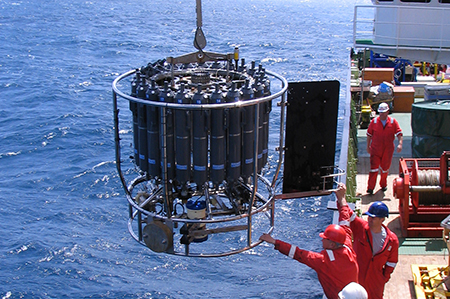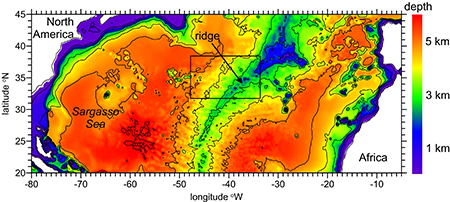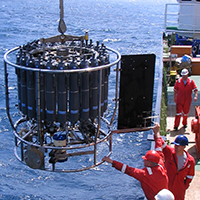 Samples will be taken from a research cruise to measure the turbulence and nutrient concentrations across the mid-Atlantic ridge
Samples will be taken from a research cruise to measure the turbulence and nutrient concentrations across the mid-Atlantic ridge
Scientists at the University of Liverpool have been awarded funding to explore how nutrients in the deep mid-Atlantic ocean are transported to the surface, where they support biological growth.
Large areas of ocean in the subtropical Atlantic appear to be devoid of nutrients close to the sea surface, but despite this plants are able to grow there. New research at Liverpool suggests that scientists have been looking for the source of this growth in the wrong place, which could in fact originate in the mid-Atlantic.
Mystery biological growth
Oceanographer Professor Jonathan Sharples, who is leading the research said: “This project brings together research expertise in tides, shallow shelf seas and deep oceans to explore the mystery of how biological growth over the mid latitude ocean is sustained.
“We want to explore whether tides passing over the mid-Atlantic ridge generate enhanced turbulence which provides a nutrient supply to the upper waters which can then be transported horizontally to the western side of the basin and the Sargasso Sea.
 The area of Atlantic Ocean being explored by the research team
The area of Atlantic Ocean being explored by the research team
The team will use instruments located across the mid-Atlantic ridge, a band of mountains and valleys that run along the Atlantic Ocean floor. Samples will be taken from a research cruise to measure the turbulence and nutrient concentrations over the area.
The researchers will combine the data with computer models of the water circulation patterns to find out what causes the nutrient-rich water to reach the ocean surface.
Phytoplankton
The data will help identify where the nutrients are then transported to fuel growth of phytoplankton, single-celled plants that lie at the heart of the global cycling of carbon between the atmosphere and the oceans.
The research will help scientists understand how carbon is cycled between the atmosphere and oceans, and how it affects global climates.
The research is supported by the Natural and Environmental Research Council (NERC) and involves the National Oceanography Centre (NOC) in Liverpool and the Universities of Southampton and Bangor.
